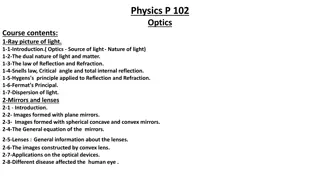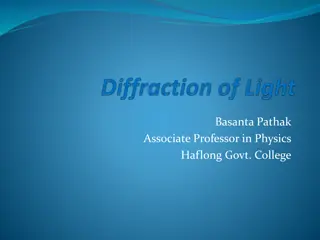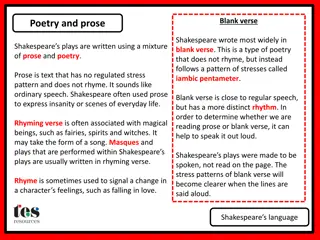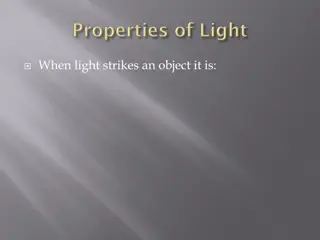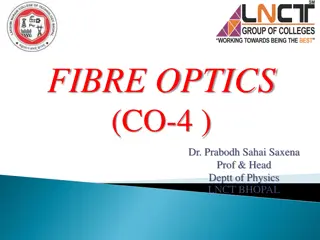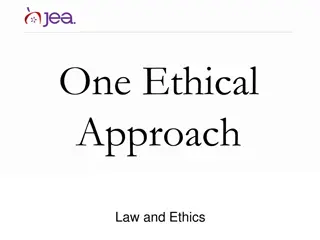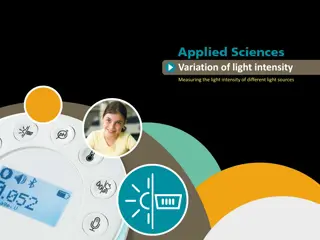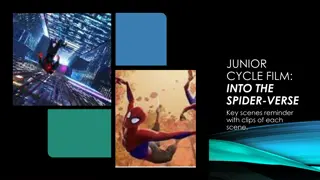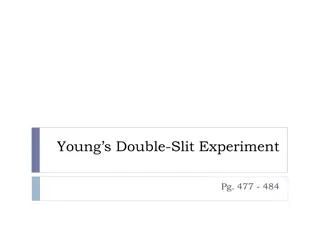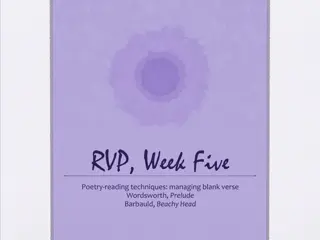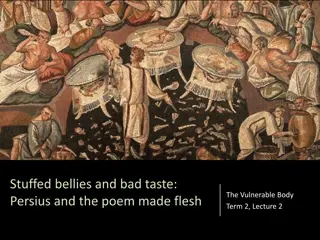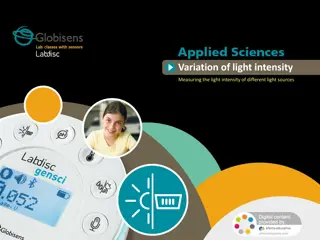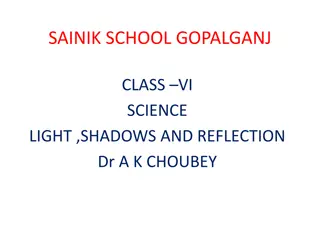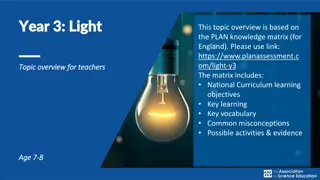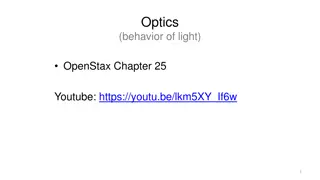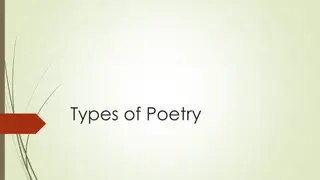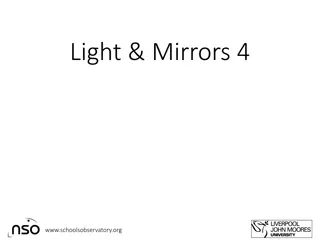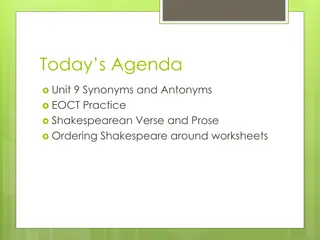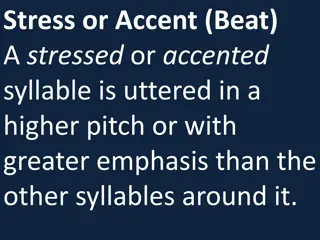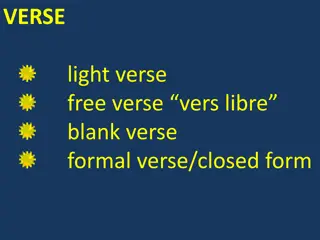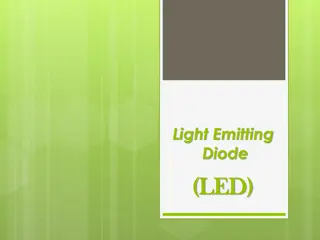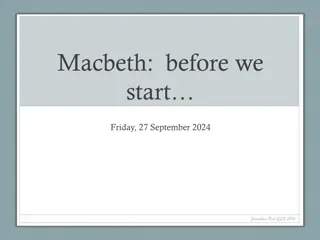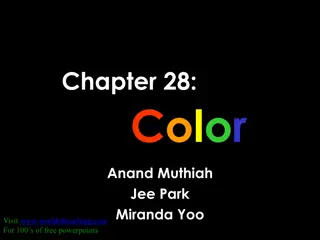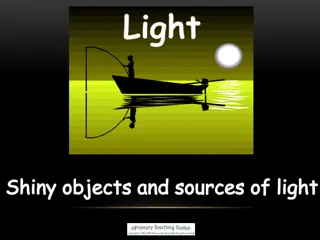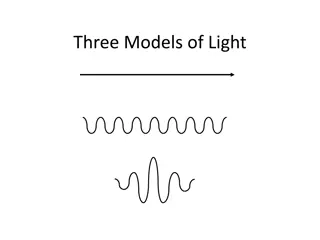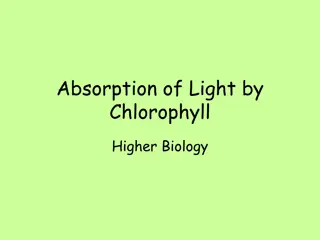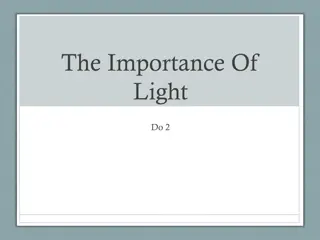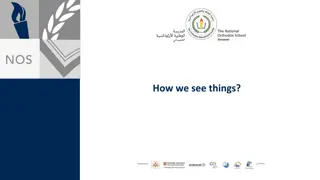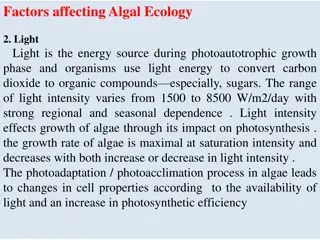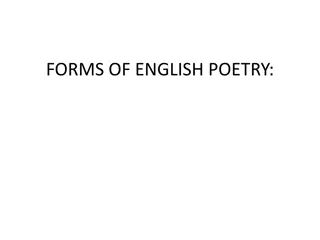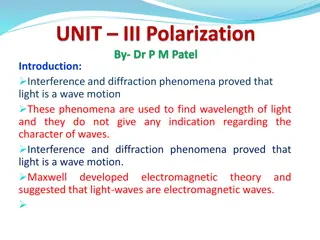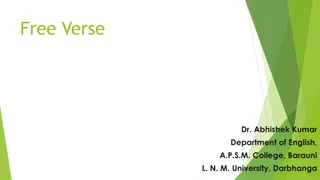Exploring Optics: Light Behavior and Properties
Optics studies the behavior of light, its interaction with matter, and the construction of instruments using or detecting light. From the dual nature of light to the laws of reflection and refraction, this branch of physics delves into topics like mirrors, lenses, and the dispersion of light. Practi
2 views • 15 slides
Understanding Prism Terminology and Light Deviation
Prisms are optical devices that deviate light without changing its vergence. This module explores the various terminology associated with prisms, including Apex, Base, Refracting Angle, and Angle of Deviation. The passage of light through a prism follows Snell's Law, where the ray is deviated toward
4 views • 42 slides
Understanding Diffraction of Light: Types and Distinctions
The propagation of light according to the wave theory involves diffraction, where light waves exhibit bending around obstacles, causing a decrease in intensity. There are two main types of diffraction - Fresnel's and Fraunhofer's, each characterized by different conditions and behaviors. The distinc
1 views • 7 slides
Workers Compensation Solutions for Light Duty Job Assignments
Learn effective solutions for Workers Compensation Light Duty job assignments. This guide provides strategies to create and implement light-duty roles, helping injured employees return to work safely and efficiently. Understand essential benefits and best practices for managing light-duty assignment
9 views • 4 slides
Sensory Magic: A Verse of Delightful Experiences
Delve into a poetic journey that captures the beauty of sights, sounds, scents, textures, and flavors through vivid descriptions. From the mesmerizing visuals of nature to the enticing aromas and comforting sensations, each verse paints a multi-sensory picture that stirs emotions and memories. Immer
0 views • 10 slides
Understanding Shakespeare's Versification: Blank Verse, Iambic Pentameter, and Sonnets
Shakespeare's writing encompassed various forms of poetry and prose, notably blank verse, iambic pentameter, and sonnets. His works showcase a mastery of language and rhythm, with blank verse representing unrhymed poetry following iambic pentameter patterns, while sonnets adhere to strict rhyme sche
0 views • 6 slides
Understanding the Interaction of Light with Objects
When light strikes an object, it can be reflected, transmitted, or absorbed, depending on the material of the object. Transparent materials allow light to pass through, translucent materials scatter light, and opaque materials absorb and reflect light. The color of objects is the color they reflect,
6 views • 17 slides
Overview of Optical Fibre Technology and Applications
Optical fibre technology, spearheaded by Dr. Prabodh Sahai Saxena, revolutionizes communication systems through light transmission. This cutting-edge technology utilizes fibre optics made of glass or plastic to carry light signals, offering advantages like high bandwidth, low signal loss, and no ele
0 views • 20 slides
Evolution of Light Theory: From Wave Theory to Quantum Theory
At the turn of the century, the discovery of the photoelectric effect challenged the wave theory of light, leading to the development of the quantum theory by Max Planck and Albert Einstein. This new theory introduced the concept of discrete energy units known as quanta, bridging the gap between wav
1 views • 62 slides
Light Tracking Servo System Using Cadmium Sulfide Resistors
Introduction to an Arduino-based light tracking system using Cadmium Sulfide light-dependent resistors. The system tracks the maximum light intensity and automatically adjusts its direction towards the brightest source. It includes an Arduino-based Lux Meter and specifications such as DAC resolution
0 views • 7 slides
Ethical Approaches in Journalism: Red Light vs. Green Light Ethics
Explore the contrasting perspectives of Red Light and Green Light ethics in journalism, where Red Light focuses on caution and restraint while Green Light emphasizes action and opportunity. Dive into the nuances of ethical decision-making in journalism and consider the impact of language on ethical
0 views • 13 slides
Understanding Light Intensity Variation in Different Sources
Explore the correlation between light intensity and efficiency in various light sources through an intriguing experiment. Delve into the theoretical framework and practical applications to grasp the essence of light intensity and its distribution. Uncover the factors influencing the efficiency of li
0 views • 21 slides
Key Scenes Reminder from "Into the Spider-Verse" Junior Cycle Film
Explore key scenes from the film "Into the Spider-Verse" including the moment Miles gets bitten, his encounter with Spider-Man, the death of Spider-Man, and the significant scene titled "It Always Fits... Eventually." Each scene is visually captivating and filled with symbolism, enhancing the overal
1 views • 17 slides
Understanding Young's Double-Slit Experiment and Interference Patterns
Thomas Young's double-slit experiment in the late 1700s provided evidence of light behaving as a wave, showcasing interference patterns. This experiment challenged the particle theory of light and supported the wave theory. The interference patterns observed helped scientists grasp the wave nature o
0 views • 27 slides
Exploring Poetry Reading Techniques and Themes in Blank Verse Literature
Dive into the world of poetry reading techniques and themes in blank verse literature through the exploration of Wordsworth's "Prelude," Barbauld's works, and "Beachy Head." Discover the nuances of managing blank verse, the shift from epic to romantic poetry, and the reflective and organizational as
4 views • 22 slides
Exploring Roman Verse Satire Through Bodies: Horace and Persius
Delve into the representation and treatment of bodies in Roman verse satire through the works of Horace and Persius. Analyze how these poets intertwine physical vulnerabilities, personal histories, and societal critique within their satirical compositions. Discover the power of vulnerability in sati
0 views • 14 slides
Understanding Light Intensity: Measuring Different Light Sources
Explore the concept of light intensity by measuring various light sources and their efficiency. Through practical experiments, understand the relationship between light intensity and the output of different light sources. Theoretical frameworks, practical applications, and key concepts are discussed
0 views • 21 slides
Understanding Light: Basic Properties and Interactions
Explore the fundamental properties of light such as its speed compared to sound, the formation of shadows, and how we see things through reflection. Dive into types of light interactions like refraction and reflection, understanding how light behaves when passing through different mediums and intera
0 views • 27 slides
Understanding Light, Shadows, and Reflection in Science
Light is a vital form of energy that helps us see objects. Luminous objects emit light, while non-luminous objects do not. Understanding how light interacts with objects, creating shadows and reflections, is crucial in science. Transparent objects allow light to pass through, translucent objects all
0 views • 13 slides
Understanding Light: Key Concepts for Year 3 Students
Delve into the world of light with Year 3 students through engaging activities and explorations. Learn about sources of light, shadows, reflective surfaces, and the importance of light for vision. Discover how light helps us see and how shadows are formed, while exploring materials and objects that
0 views • 9 slides
Understanding the Behavior of Light in Optics
Light in optics can be described as a wave, a particle, or a ray. The ray model of light explains how light travels in straight lines unless it interacts with a surface or changes media. By tracing rays back, we can locate objects and understand how light interacts with matter at boundaries between
0 views • 39 slides
Analysis of "Hotel Room, 12th Floor" by MacCaig
An in-depth analysis of the poem "Hotel Room, 12th Floor" by MacCaig, written in 1966. The poem delves into broader questions about humanity, contrasting technological progress with past and present aggression in American society. It explores the balance between light and dark, good and evil, and th
0 views • 29 slides
Explore Various Types of Poetry with Descriptions and Visuals
Discover different types of poetry, from traditional forms like Haiku, Blank Verse, and Ballad to modern styles like Free Verse and Limerick. Learn about their structures, purposes, and prominent examples, accompanied by visual representations for better understanding.
0 views • 8 slides
Unraveling Shakespeare's Genius: Iambic Pentameter and Blank Verse Explained
Shakespeare's unparalleled literary genius lies in how he crafted his works using iambic pentameter and blank verse. This guide delves into the intricacies of these poetic forms, shedding light on why they elevate Shakespeare's writing to legendary status.
0 views • 12 slides
Exploring Light and Mirrors: Investigations and Discoveries
Delve into the world of light and mirrors as we investigate angles of reflection, examine how mirrors affect the perception of objects, and explore the use of periscopes in observing underwater. Discover the rules governing the reflection of light beams and unravel the mysteries of how mirrors manip
0 views • 11 slides
Understanding Shakespearean Verse and Prose: A Comprehensive Guide
Delve into the intricate world of Shakespeare's language with a focus on prose, rhymed verse, and blank verse. Learn how to distinguish between these forms and their significance in his plays through visual and textual clues. Explore examples of rhymed couplets and heroic couplets, shedding light on
0 views • 24 slides
Understanding Poetry Meter and Verse Types
Explore the various aspects of poetry meter and verse types including stress or accent, accentual verse, syllabic meter, and accentual-syllabic verse. Learn about stressed/accented syllables, rhythmical patterns, syllable counting, types of feet in poetry, and examples of different metrical structur
0 views • 18 slides
Forms of Versification in Poetry Explained
Explore different types of versification in poetry, including Light Verse, Free Verse, Blank Verse, and Closed/Formal Verse. Learn about their characteristics, examples from renowned poets, and how they contribute to the art of poetry. Discover the nuances of each form and enrich your appreciation f
0 views • 5 slides
Understanding Light Emitting Diodes (LEDs)
Light Emitting Diodes (LEDs) are semiconductor devices that convert electrical energy into visible or invisible light. They are constructed using gallium, phosphorus, and arsenic materials instead of silicon or germanium. The recombination process in forward bias condition is crucial for the operati
0 views • 19 slides
Understanding Shakespeare's Verse in Macbeth
Explore the basics of Shakespeare's verse in Macbeth, including the use of iambic pentameter, blank verse, and the variation of verse for different characters and moods. Discover the importance of meter and how it enhances the dramatic effect of the play. Dive into introductory readings and gain ins
0 views • 12 slides
Understanding Color: A Comprehensive Overview
Color is a fascinating aspect of our visual world, explored through the prism of science and light. This chapter delves into the origins of color perception, from Isaac Newton's study of the color spectrum to the reflection and transmission of light that determines how we see colors. Gain insights i
0 views • 28 slides
Understanding Sources of Light and Reflection
Exploring the concept of light sources and reflection, the article delves into how light is created by various objects like the sun, light bulbs, and fires. It explains the difference between sources of light and objects that reflect light, such as shiny metal surfaces. The reader is encouraged to i
0 views • 14 slides
Exploring Models of Light: Ray Model and Wave Model
This informative content delves into the Ray Model of Light, discussing how light travels in straight lines known as rays and how it can be made visible. It also explores the Wave Model of Light, covering topics like diffraction and the reasons why we often do not notice it. Additionally, the text t
0 views • 9 slides
Understanding Light Absorption by Chlorophyll in Biology
Explore how chlorophyll absorbs light in photosynthesis, the role of different types of seaweeds, and the use of spectrometers to measure light absorption. Discover the specific light regions absorbed by chlorophyll A and B, as well as adaptations in seaweeds for varying light intensities. Learn abo
0 views • 9 slides
Investigating the Role of Light in Photosynthesis
Explore the significance of light in photosynthesis through a structured scientific investigation involving plants, testing the necessity of factors like carbon dioxide, water, and light. Follow a hypothesis-driven approach to observe the production of oxygen in plants exposed to light versus dark c
0 views • 12 slides
Understanding Light: How We See and Interact with Objects
Explore the fascinating world of light and vision, from how light travels in straight lines to how we perceive objects. Learn about luminous and nonluminous objects, the different categories of light sources, and the vocabulary associated with light interactions. Delve into the concepts of emitting,
0 views • 7 slides
Factors Affecting Algal Ecology: Light Intensity Impacts on Algae Growth and Composition
Light intensity plays a crucial role in the growth and composition of algae. Algae undergo photoadaptation processes to adjust to varying light levels, affecting their photosynthetic efficiency and cellular properties. High light intensity can lead to photoinhibition and changes in cellular composit
0 views • 19 slides
Understanding Forms of English Poetry: Blank Verse and Free Verse
Discover the nuances of Blank Verse and Free Verse in English poetry. Blank verse, characterized by unrhymed iambic pentameter, offers a structured yet flexible form for poetic expression. On the other hand, Free Verse grants poets the freedom to experiment with words unrestricted by traditional rhy
0 views • 14 slides
Understanding Light Wave Polarization and Brewster's Law
Interference and diffraction phenomena demonstrate light as wave motion, leading to insights on wave nature. Maxwell's electromagnetic theory supports light as transverse waves. Learn about polarization of light waves, production methods, and applications in industry. Explore the discovery of light
0 views • 89 slides
Understanding Free Verse Poetry: Definition, Examples, and Analysis
Free verse poetry, as explored by Dr. Abhishek Kumar, defies traditional poetry rules by liberating poets from meter and rhyme constraints. This form allows unlimited artistic expression through unique structure and uses poetic devices like alliteration and rhythm. Examples from Walt Whitman and Ezr
1 views • 7 slides
